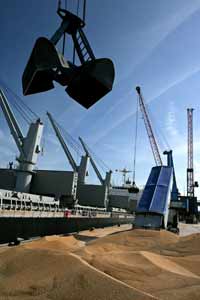Scope for further 2010 wheat price rises, says analyst

UK wheat prices have the potential to increase by up to £20/t in the remainder of the 2010 crop season, according to one industry analyst.
“The UK is one of the cheapest EU origins of quality wheat this year. The gap between UK and French wheat prices is too wide and this is fuelling rapid exports,” said HGCA senior analyst Jack Watts at UK Grain on Wednesday (3 November).
Grain traders estimate that 1m tonnes of the UK’s 1.3m tonnes exportable surplus had already been shipped by the end of October. Because of high demand and the price differential between UK and continental stocks, a further 500,000t of additional wheat exports is possible.
Assuming domestic consumption remains steady this would leave the UK with just 1.5m tonnes at the end of the 2010 crop year – the bare minmum to cover feed compounders and millers’ requriements – leaving room for further price increases as buyers moved to see their requirements met.
With the 2010 UK wheat crop well able to meet export demand for better-quality wheats, it was logical that UK values could rise to meet French prices if they remained firm, he said.
However, farmers should not take this for granted, as French prices could fall as a result of currency changes or other external factors, he said. But there was nothing fundamental to the market which indicated a drop was imminent, said Mr Watts.
Next season, it was possible the whole EU community could see opening stocks of just 9m tonnes – half the level seen two years ago. This set up the European market for potential volatility in 2011 because the EU would be relying more on production from the 2011 harvest, instead of reserved stocks, said Mr Watts.
Coupled with this, UK wheat prices from harvest 2011 would be far more exposed to volatility in the US maize market than anything else. Demand for US maize was such that record harvests were now consistently required to meet it and this year harvest had failed to deliver, causing upward pressure on world grain prices.
Mr Watts suggested farmers spend more time on their marketing strategies as these had the potential to affect profitability even more than their technical crop production decisions. “Managing price is now as important as managing agronomy; there is no certainty in these grain markets any more,” he said.

